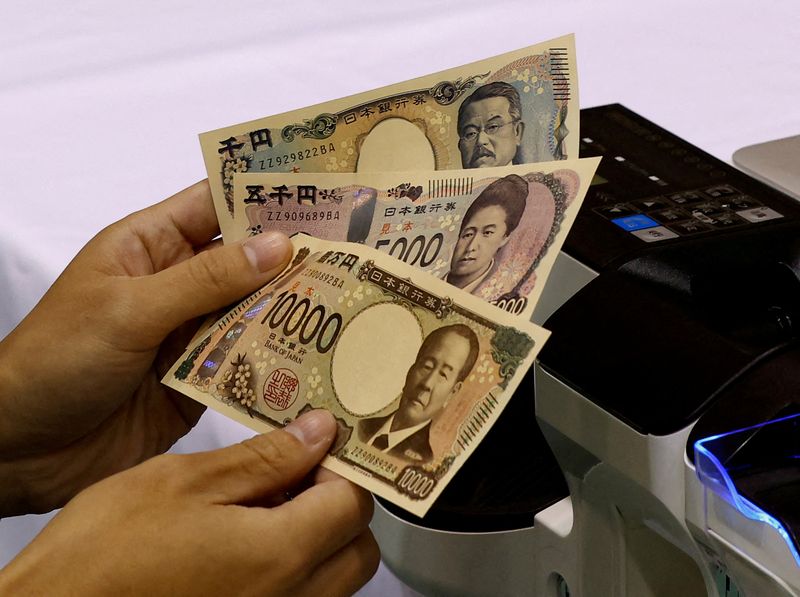By Tom Westbrook
SINGAPORE (Reuters) - Investors are cutting the yen adrift, cooling on the idea that a big rally is just around the corner even as bets firm that a policy shift in Japan could come as soon as next week.
Little by little, the view that the Japanese currency was the cleanest wager against the dollar - destined to zoom as Japan hiked interest rates while the Federal Reserve cut - has faded as the dollar's stubborn strength has dominated trade.
One result is an uneasy calm in spot and options markets for dollar/yen as traders give up waiting for the yen to bounce.
Another is a dulling of the yen's allure as both a funding currency and a haven, since the risk of intervention on one hand and a policy shift on the other have left the yen in stasis.
"Earlier in the year everyone thought dollar/yen was heading to 120," said Patrick Law, head of Asia-Pacific FX trading at Bank of America in Hong Kong. "But now, very few people would expect it to go down that much."
Driven weaker by the widening gap between U.S. and Japanese interest rates, the yen has lost 13% on the dollar this year and at 150 is near the three-decade low of 151.94 that prompted government intervention a year ago.
A real effective exchange rate index value of 72.4 for the yen in September is the lowest since the Bank of International Settlements' records began in 1994 and lower than any of the Bank of Japan's retrospective projections, which date to 1970.
Yet even after the Bank of Japan took a step toward policy normalisation in July and loosened limits on bond yields, the yen fell - putting question marks over prospects for a sustainable rally built on higher Japanese interest rates.
Options pricing illustrates a market unprepared for - or unwilling to bet on - any dramatic rebound happening soon.
One-week implied volatility has spiked in advance of an Oct. 31 central bank meeting. However at most other tenors it touched 18-month lows in October and skew, which can measure directional bets, shows a steady decline in the relative popularity of dollar/yen puts over the year to date.
Market participants say what's changed is the expectation that Japan would be in the driver's seat for the yen this year.
"Even if the BOJ moves, you know, it's so powerless," said Masafumi Yamamoto, chief currency strategist at Mizuho Securities in Tokyo
"It's much smaller than the fluctuation of the U.S. yields," he said. "Dollar/yen is a function of U.S.-Japan yield gap and the U.S.-Japan yield gap is a function of the U.S. economy."
GO SLOW
The yen has hardly budged through a month where war in the Middle East has lifted other safe haven assets, such as gold and the Swiss franc, and while speculation has intensified that the BOJ will start raising interest rates before long.
Ten-year government bond yields have been steadily climbing toward the 1% limit of policymakers' tolerance. A handful of economists polled by Reuters expect a policy shift as soon as next week's meeting, and most think short-term rates will rise into positive territory next year.
Yet together with the risk of intervention, it only seems to have stopped the yen from falling, rather than driving the sort of rally investors had been girding for at the outset of 2023.
"Yen was very much the main thing that people wanted to talk about several months ago," said Shafali Sachdev, head of investment services for Asia at BNP Paribas (OTC:BNPQY) Wealth Management.
"It has become a bit less urgent, or a lot less urgent ... of late," she said. To be sure, Sachdev said interest in 'carry trades' - borrowing yen to sell for higher-interest paying currencies is waning, while investors have been keen for long exposure to yen assets.
Long-term stock investors also say they are content to forget about currency hedging, in the hope the yen won't fall and that an eventual rally juices their returns.
Citi has advised bets on the yen staying steady even longer. Buying calls that bet on little change or a small fall in the yen can profit if it dips to 153 or 155 to the dollar, or cover their own cost if it stays flat, the strategists said in an emailed trade suggestion.

"Market expectations for when the BOJ could begin to normalise policy are too early in our view," they said.
"The upcoming BOJ meeting may serve as a reminder that normalisation will be slow."